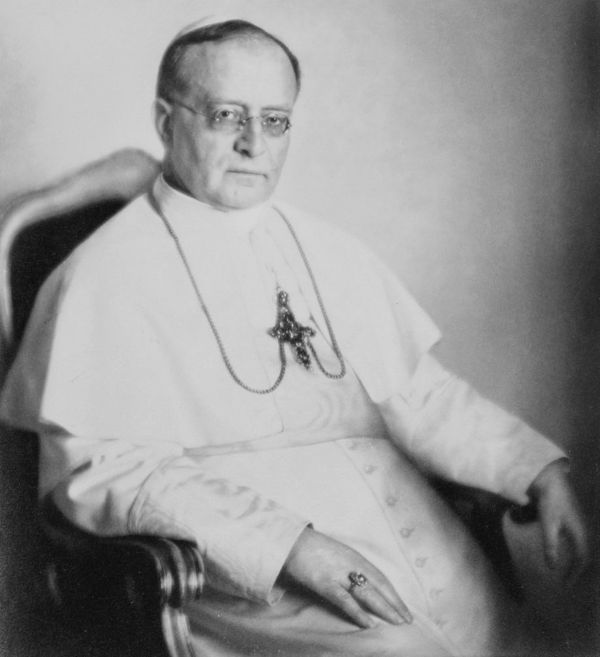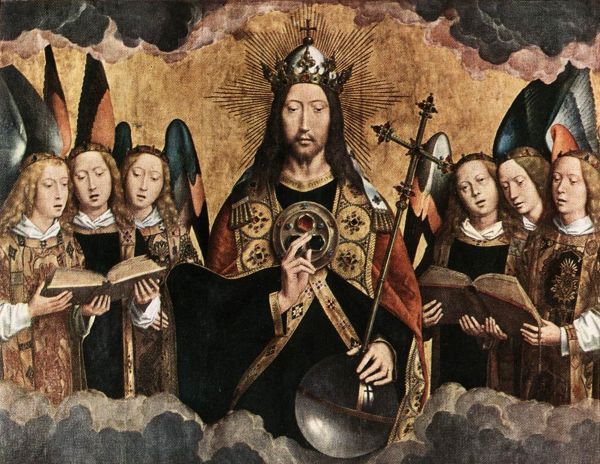In 1925, Pope Pius XI published Quas primas, the encyclical that officially established Christ the King as a principal feast on the liturgical calendar. That was December 11, 1925.
Five months earlier, on July 18, 1925, Hitler published Mein Kampf.
It’s no coincidence that those two events transpired in the same year.
Three years earlier, when Pius XI first became pope he published Ubi arcano. In this first encyclical, he set the motto for his pontificate: “The Peace of Christ in the Kingdom of Christ.” Why make “peace” the goal of your pontificate when the Great War was over? Hadn’t the peace already been achieved?
“No,” Pius said. “Don’t trust the treaties.”1 He knew that a world which had rejected Christ and still clung to its nationalistic, nihilistic ideologies could never actually be at peace. He witnessed the Bolshevik Revolution and the Red Terror. Across the Atlantic, he knew of the Constitution of 1917 in Mexico whose goal was to “effectively outlaw the Roman Catholic Church.”2 How could the Great War not have happened? In his mind, global conflict and destruction was necessarily the result of governments set on eradicating Christ.

And still the world, after it all – after four torturous, war-stricken years – still hadn’t learned its lesson. In the wake of World War I, Christ was not a part of the solution. Nietzsche, and the political ideologies that arose out of his thinking, wouldn’t allow it. God was dead after all.3 There was no choice but to rebuild without Him.
So Pius XI – with the mounting threat of godless politics, anticlericalism, and a world who appeared to not learn its lesson – stomped his foot on the ground, and said, “I won’t stand for this! We need a King – One who brings true peace!”:
“Oh what happiness would be Ours if all men, individuals, families, and nations would but let themselves be governed by Christ!”4
He dreamed of a world that didn’t have to create meaning on its own, whose values weren’t pulled out of thin air to fill the void, leaving us with murderous and destructive ideologies. He dreamed of a world whose governments ruled based on universal principles, established by Christ. He dreamed of a world where Christ’s “supreme and absolute dominion over all things created” was recognized by all.5
If you read the words of Quas primas, where Pius XI cemented his stance by instituting the Feast of Christ the King, you can almost feel this longing in his words. A longing, I can only guess, that sprung from the terrible things he heard and witnessed in the decade before. What a statement to make to the people living in 1925! “There can only be one King. And we should all remember that. Especially now.” That is the message of the feast of Christ the King.

Did the world listen?
No, it listened to the message of Mein Kampf… or some other version of it.
Just a few years later, Hitler made his moves within the German government and officially took over in 1933. Stalin, having already succeeded Lenin, ousted his opponents and accomplished the same in the Soviet Union by 1934. By 1939, when Pius XI is approaching his death, World War II has nearly begun.
Maybe Pius XI was only a dreamer. Maybe he was naïve to think the world could recognize its errors and choose to make Christ its King.
Maybe.
But maybe he had great hope in what the People Of Whom He Was Shepherd could do. Maybe he knew that if only they would respond, he had an entire army of soldiers ready to go into battle. Not into physical battle for physical victories, but into spiritual battle for men’s hearts. Into battle for the soul, not for the state: “When [the laity] participates in the works of the apostolate…they are more than ever united with Us and with Christ, and become great factors in bringing about world peace because they work for the restoration and spread of the Kingdom of Christ.”6
Today, this army may be small, but the stakes are just as high. Totalitarian regimes may seem far off in other continents and centuries, but the totalitarian regime of materialism, addiction, and despair reigns with an even stronger iron fist.

Could we answer Pius XI’s call? Could we at least answer him and say, “I will let my own heart be ‘governed by Christ’”? Could we go one step further and say, “I will seek to make my family and community be ‘governed by Christ’”?
I can’t help but think that the tiny victories of heart, family, and community are the ones that matter. What would it mean to formally and finally make Christ King? What would you need to do?
Whatever it is, on this Solemnity of Christ the King, I pray we can all bring what we have decided to give to Him and see Him glorious and triumphant, gazing at us with kingly eyes, saying, “Well done, my good and faithful servant… Come, share your master’s joy” (Mt 25:21).
- Pope Pius XI (1922). Ubi arcano, p. 20.
- Toft, Monica Duffy, Daniel Philpott and Timothy Samuel Shah, (2011). God’s Century: Resurgent Religion and Global Politics, p. 171, W.W. Norton & Co.
- Nietzsche, F. (1974). The gay science. (Kaufmann, W., Trans.). New York: Vintage, pp. 181-182.
- Pope Pius XI (1925). Quas primas, p. 20.
- Ibid. p. 7.
- Pope Pius XI (1922). Ubi arcano, p. 58.
